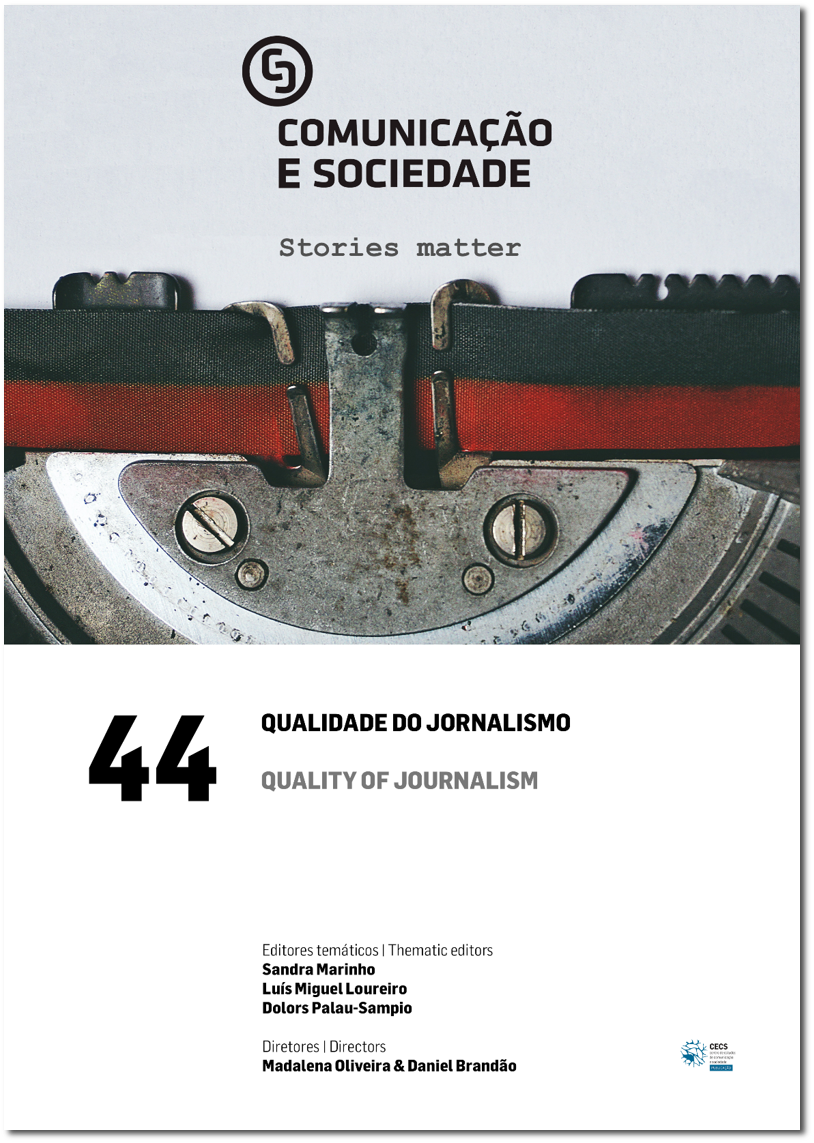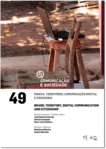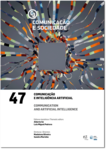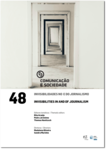Novas Fronteiras do Jornalismo de Investigação: Do Lobo Solitário à Alcateia
DOI:
https://doi.org/10.17231/comsoc.44(2023).4561Palavras-chave:
jornalismo de investigação, jornalismo de qualidade, jornalismo quotidiano, tecnologia, mercadoResumo
Este artigo recorre à revisão bibliográfica para percorrer 100 anos de história do jornalismo de investigação, fixando-se no conceito, em toda a sua amplitude, ao eleger a investigação jornalística como a expressão mais direta do jornalismo de qualidade.
Retomando a discussão sobre as diferenças entre jornalismo de investigação e jornalismo quotidiano, que, ainda hoje, cria clivagens no seio da classe jornalística, mas também na academia, este artigo rejeita a visão abrangente de que todo o jornalismo é de investigação.
Avaliando o impacto dos fatores externos, como o mercado e a tecnologia, na matriz do conceito de jornalismo de investigação, esta análise tenta identificar soluções que contribuam para que a função de cão de guarda, atribuída ao jornalismo de investigação, permaneça ativa.
Nesse sentido, este artigo aprofunda as novas fronteiras do jornalismo de investigação, salientando o potencial da tecnologia digital para, simultaneamente, manter sob escrutínio os poderes num mundo cada vez mais complexo; criar redes de colaboração entre jornalistas que alarguem a escala das matérias publicadas e reforcem o impacto; promover parcerias entre órgãos de comunicação social, entidades não lucrativas e universidades; encontrar soluções, que tardam, para que o jornalismo de investigação chegue aos territórios periféricos, onde ainda tem uma expressão absolutamente residual.
Downloads
Referências
Anderson, D., & Benjaminson, P. (1976). Investigative reporting. Indiana University Press.
Antelava, N. (2018). In-depth crisis reporting. In O. Hahn & F. Stalph (Eds.), Digital investigative journalism (pp. 217–229). Palgrave Macmillan.
Aucoin, J. (2005). The evolution of American investigative journalism. University of Missouri Press.
Bell, E., & Owen, T. (2017). Journalism after Snowden: The future of the free press in the surveillance state. Columbia University Press.
Benjamin, M. (2014, 10 de outubro). Why are the media playing lapdog and not watchdog – again – on war in Iraq? The Guardian. https://www.theguardian.com/commentisfree/2014/oct/10/media-lapdog-sold-war-in-iraq
Birnbauer, B. (2019). The rise of nonprofit investigative journalism in the United States. Routledge.
Burgh, H. (2021). Introduction. In H. de Burgh & P. Lashmar (Eds.), Investigative journalism (pp. 11–31). Routledge.
Cagé, J. (2016). Saving the media: Capitalism, crowdfunding and democracy. The Belknap Press of Harvard University Press.
Coelho, P., & Rodrigues, I. A. (2020). Rebuilding investigative journalism. Collaborative journalism: Sharing information, sharing risk. Observatorio (OBS*), 14(4), 135–157. https://doi.org/10.15847/obsOBS14420201748
Coelho, P., & Silva, M. T. (2018). O lucro social e financeiro do jornalismo de investigação. Media & Jornalismo, 32(18), 73–94. http://hdl.handle.net/10362/63552
Coelho, P., & Silva, M. T. (2021). A resistência do jornalismo de investigação. In J. C. Correia & I. Amaral (Eds.), De que falamos quando dizemos “jornalismo”? Temas Emergentes de Pesquisa (pp. 25–53). Labcom.
Días-Struck, E., & Cabra, M. (2018). Uncovering international stories with data and collaboration. In O. Hahn & F. Stalph (Eds.), Digital investigative journalism (pp. 55–67). Palgrave Macmillan.
Downie, L., Jr., & Schudson, M. (2009, novembro/dezembro). The reconstruction of American journalism. Columbia Journalism Review. https://archives.cjr.org/reconstruction/the_reconstruction_of_american.php
Freitas, A., Silva, A., & Amante, S. (2019). Re(a)presentações do jornalismo de investigação na voz dos profissionais de comunicação. In T. A. de Barros, S. Ferreira, P. Lobo, S. Morais, P. Rodrigues, F. Sobral, & L. Sousa (Eds.), Ciências da comunicação: Vinte anos de investigação em Portugal (pp. 663–684). SOPCOM/Instituto Politécnico de Viseu.
Gellhorn, M. (2007). A face da guerra (C. Vitorino & I. Veríssimo, Trads.). Dom Quixote. (Trabalho original publicado em 1959)
Guevara, M. W. (2016, 7 de dezembro). Radical sharing: Breaking paradigms to achieve change. International Consortium of Investigative Journalists. https://www.icij.org/inside-icij/2016/12/radical-sharing-breaking-paradigms-achieve-change/
Hahn, O., & Stalph, F. (Eds.). (2018). Digital investigative journalism. Palgrave Macmillan.
Hamilton, J. T. (2016). Democracy's detectives, the economics of investigative journalism. Harvard University Press.
Harcup, T. (2014). Oxford dictionary of journalism. Oxford University Press.
Houston, B., & Horvit, M. (2021). The investigative reporter’s handbook. IRE.
Hoxha, A. (2019). Investigative journalism. In T. P. Vos & F. Hanusch (Eds.), The international encyclopedia of journalism studies. John Wiley & Sons. https://doi.org/10.1002/9781118841570.iejs0134
Hunter, M. L. (2018). Story-based inquiry: A manual for investigative journalists. UNESCO.
Jack, I. (2006). Introduction. In I. Jack (Ed.), The Granta book of reportage (pp. v–xiii). Granta Books.
Knobel, B. (2018). The watchdog still barks. Fordham University Press.
Kovach, B., & Rosenstiel, T. (2007). The elements of journalism (completely updated and revised). Three Rivers Press.
Kovach, B., & Rosenstiel, T. (2010). Blur. How to know what’s true in the age of information overload. Bloomsbury.
Kreimer, B. (2018). Drone journalism: Storytelling from a new perspective. In O. Hahn & F. Stalph (Eds.), Digital investigative journalism (pp. 91–103). Palgrave Macmillan.
Lanosga, G., Willnat, L., Weaver, D., & Hounston, B. (2015). A breed apart? A comparative study of investigative journalists and US journalists. Journalism Studies, 18, 265–287. https://doi.org/10.1080/1461670X.2015.1051570
Lehren, A. (2018). The rise of investigative data journalism. In O. Hahn & F. Stalph (Eds.), Digital investigative journalism (pp. 9–19). Palgrave Macmillan.
Lubars, W., & Wicklein, J. (1975). The lessons of Watergate: A two day conference. Boston University.
Lück, J., & Schultz, T. (2019). Investigative data journalism in a globalized world. Journalism Research, 2(2), 93–114. https://journalistik.online/en/paper-en/investigative-data-journalism-in-a-globalized-world/
Marinho, S. (2015). Jornalismo e formação em mudança: Modelos e construções na análise do caso português. CECS.
Meyer, P. (2004). The vanishing newspaper, saving journalism in the information age. University of Missouri Press.
Neveu, É. (2004). Sociologia do jornalismo. Porto Editora.
Novais, R. A. (2022). Na linha de fogo: A adversatividade do jornalismo de investigação português na cobertura do populismo de extrema-direita. Media & Jornalismo, 22(40), 301–318. https://doi.org/10.14195/2183-5462_40_15
Pilger, J. (2005). Tell me no lies, investigative journalism and its triumphs. Vintage Books.
Posetti, J. (2018). The future of investigative journalism in an era of surveillance and digital privacy erosion. In O. Hahn & F. Stalph (Eds.), Digital investigative journalism (pp. 9–19). Palgrave Macmillan.
Radu, J. (2018). Visual storytelling: Show, not tell? Show and tell. In O. Hahn & F. Stalph (Eds.), Digital investigative journalism (pp. 113–123). Palgrave Macmillan.
Ramonet, I. (2011). L'Explosion du journalism, des médias de masse à la masse de médias. Éditions Galilée.
Randall, D. (2016). The universal journalist. Pluto Press.
Sambrook, R. (2017). Global teamwork: The rise of collaboration in investigative journalism. Reuters Institute; University of Oxford.
Sarmina, A. (2018). Fact-checking as defense against propaganda in the digital age. In O. Hahn & F. Stalph (Eds.), Digital investigative journalism (pp. 193–203). Palgrave Macmillan.
Shepard, A. (2007). Woodward and Bernstein, life in the shadow of Watergate. John Wiley & Sons.
Starkman, D. (2014). The watchdog that didn't bark: The financial crisis and the disappearance of investigative journalism. University Press.
Starr, P. (2011). Goodbye to the age of newspapers (hello to a new era of corruption): Why American politics and society are about to be changed for the worse. In R. W. McChesney & V. Pickard (Eds.), Will the last reporter please turn out the lights, the collapse of journalism and what can be done to fix it (pp. 18–37). New York Press.
Tong, J. (2022). Journalism in the data age. SAGE.
Zelizer, B. (2017). What journalism could be. Polity Press.
Zelizer, B., & Allan, S. (2010). Key words in news and journalism. Open University Press.
Downloads
Publicado
Como Citar
Edição
Secção
Licença
Direitos de Autor (c) 2023 Pedro Coelho

Este trabalho encontra-se publicado com a Licença Internacional Creative Commons Atribuição 4.0.
Os autores são titulares dos direitos de autor, concedendo à revista o direito de primeira publicação. O trabalho é licenciado com uma Licença Creative Commons - Atribuição 4.0 Internacional.











